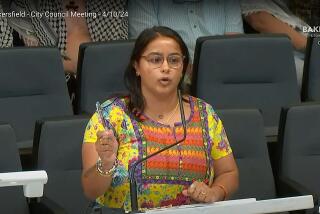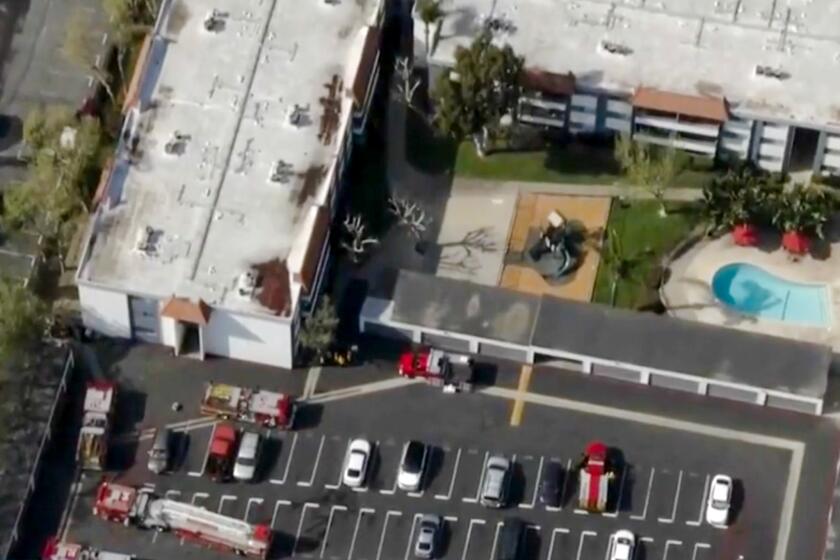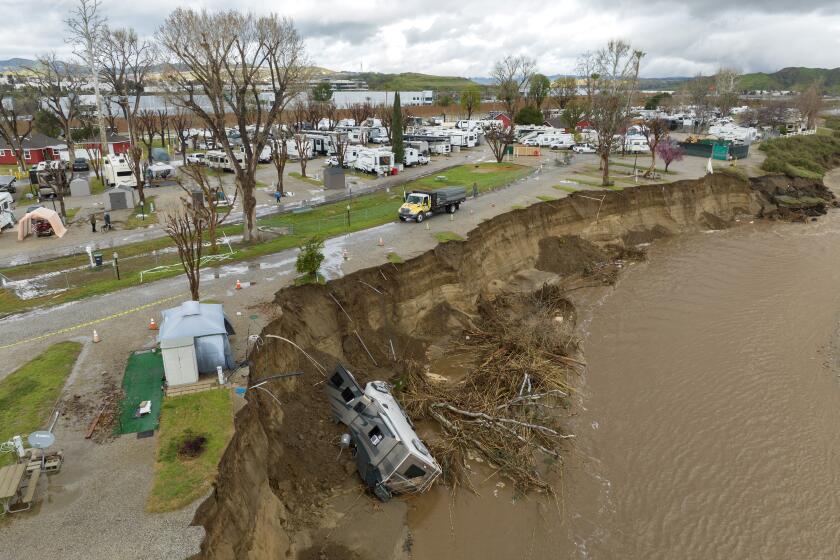Los Angeles fire camp like a little city
The Station fire was bearing down on Altadena and Sierra Madre; fire command staff was mourning the deaths of two comrades and worrying about visibility conditions that had grounded jet tankers; and most folks hadn’t slept more than four or five hours in days.
But none of that stopped mobile human relations specialist Christopher Jefferson from producing the “Thought for the Day,” a reminder to “exercise tolerance” and “respect people whose abilities, beliefs, culture, race, sexual identity . . . are different from your own.” The thought was printed in a decorative font, copied and distributed along with weather reports, maps and assignment lists to camp personnel.
This is life in the fire camp, a community of 4,700 firefighters and support staff that has sprung up in the parking lot at the Hansen Dam Recreation Area in the northeast San Fernando Valley.
When firefighters are not risking their lives in the rugged terrain of the Angeles National Forest, they return here to eat, shower and sleep in a sprawling complex of tents and mobile trailers. They can even shop: $20 T-shirts that commemorate “The Station Fire” are being sold from a tent near where another man sharpens chain-saw blades.
“This is our city,” said Dixie Dies, a public information officer who flew in from Montana to work the fire.
Early Friday morning, the compound came to a standstill for 15 minutes as more than 1,000 people remembered Ted Hall and Arnie Quinones, Los Angeles County firefighters who died Sunday in a vehicle accident near Mt. Gleason.
Some colleagues shared stories about the two men, including the time a little more than a month ago when they administered aid to a female inmate they were working with on another fire. “What an example of service before self,” Mike Bryant, one of the Station fire’s incident commanders, said afterward.
“We’re all trying to cope,” Bryant said, adding that the message of the service was “let’s put this fire out in the memory of our brothers.”
Later, a funeral procession for Hall passed the fire compound as it traveled from North Hollywood to Victorville. It passed dozens of sheriff’s patrol cars with their lights flashing, groups of firefighters in blue, sheriff’s deputies in green and a crew of prison inmates working on the fire in orange jumpsuits. Most stood at attention, removed their hats and saluted.
The week’s scene at Hansen Dam unfolds somewhere in the West almost every year, when massive wildfires draw thousands of skilled firefighters from around the country.
The Station fire, burning mostly on federal land, is overseen by Incident Cmdr. Mike Dietrich, who recently retired from the U.S. Forest Service after 33 years and who memorably referred to the fire as “angry” one day and compared it to his children the next, calling it “cranky and stubborn for no apparent reason.”
Dietrich is like the mayor of this little city, responsible for everything from the quality of the food to the efficiency of the laundry operation.
He sleeps in a sleeping bag on the floor of his trailer, rising before 5 a.m. to hear reports about what the blaze did overnight. He also checks in with his fire behavior analysts and weather specialists to hear the day’s expected conditions and how the fire is likely to react.
With that information, he and his command staff must come up with a daily plan by 6 a.m. At the same time, Dietrich and his staff weigh costs and redouble efforts to keep firefighters safe. Everyone in the camp covered their badges this week with a black stripe in honor of Hall and Quinones.
Dietrich and his staff also had to decide which areas to evacuate and which were safe enough to let residents return home. And Dietrich had to prepare briefings for a phalanx of politicians, including Gov. Arnold Schwarzenegger, Los Angeles Mayor Antonio Villaraigosa and U.S. Sen. Barbara Boxer (D-Calif.), who streamed into the camp or called.
To make it happen, fire officials create, in the middle of the tent city, something resembling a modern office, with air-conditioned trailers.
One trailer houses the computer technicians and fire behavior analysts. Another is for the safety officer, whose job is to make sure enough bottles of water and Gatorade made it up to the fire lines. (Firefighters were warned Thursday to lay off energy drinks, citing the risk of dehydration.) A third is for operations; there is also trailer space for communications, finance and travel.
In a reminder of how dangerous the job can be, there is a stream of traffic into and out of the trailer where firefighters fill out paperwork about on-the-job injuries.
Jefferson, the human resources specialist, who works for the National Park Service at Yosemite, said he deals with everything that might be found in a workplace, from inappropriate racial jokes to sexual harassment. He has also sent people home from fires because of drug use or drinking.
And he has encountered situations in which firefighters from different agencies can’t get along. “Petty infighting,” he said, shrugging to suggest that just because there are flames and smoke billowing doesn’t mean the normal annoyances of the workplace go away. Especially as fires drag on and the toll of sleep deprivation mounts.
Meanwhile, unlike with most offices, all types trickle in.
NBC anchor Brian Williams flew from New York with a large staff and multiple trailers, and broadcast the news from the side of the road. A couple whose home near Mill Creek was incinerated came to fill out damage forms. And a man collecting recyclables pushed his shopping cart through the area, drawn by the thousands of empty plastic water bottles that littered the ground.
Many veteran firefighters are accustomed to this motley parade.
Preparing to go back on the fire lines for the night shift, Brian Lynch, 37, who works for the Fire Department in Davis, near Sacramento, said he appreciated the air-conditioned sleeping trailers set up near his rig. He was also a fan of a barbecue restaurant that his team had found by searching the Internet from an iPhone. But mostly, he was here to fight the fire, while noting that this might not be his last stay in a tent city in fire-prone Southern California.
“We’ll probably be back here at least one more time,” he said.
--
Times staff writer Ari B. Bloomekatz contributed to this report.
More to Read
Start your day right
Sign up for Essential California for news, features and recommendations from the L.A. Times and beyond in your inbox six days a week.
You may occasionally receive promotional content from the Los Angeles Times.





